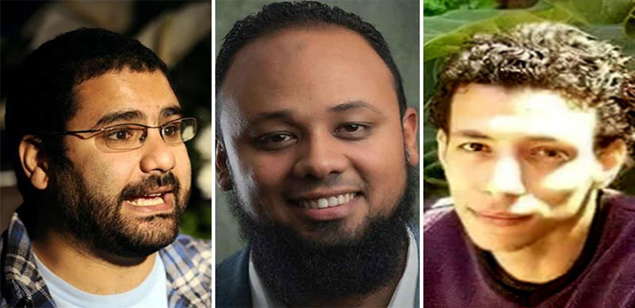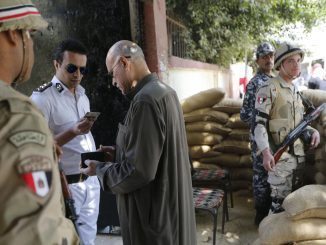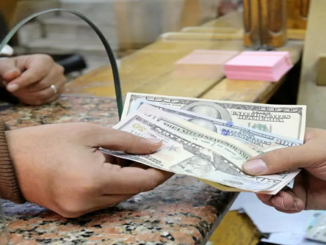
The most recent verdict against three prominent activists, including Alaa Abdel Fattah, the icon of the January Revolution (2011) has raised widespread international condemnations, especially that the verdict was issued by an emergency court.
Last Monday, an Egyptian emergency court sentenced prominent activist Alaa Abdel Fattah to five years in prison, marking the latest turn in a saga that has seen him spend most of the last decade behind bars. Meanwhile, human rights lawyer Mohamed al-Baqer, who had previously represented Abdel Fattah, and blogger Mohamed Ibrahim (Oxygen) were each sentenced to four years in prison.
Human Rights Watch published a statement, titled: “Wave of Unjust ‘Emergency’ Trials”, condemning the verdict against Abdel Fattah and his colleagues based on an “emergency” trial, “despite end to state of emergency”
“The egregious miscarriage of justice handed down by this exceptional court to punish peaceful expression reveals how Egypt’s justice system has itself become a tool of repression,” said Joe Stork, deputy Middle East and North Africa director at Human Rights Watch.
“The court should overturn the verdict and release Abdel Fattah, al-Baqer, and Ibrahim immediately.”
“The trail was rife with fair trial and due process violations. Lawyers for the defense never received a copy of the approximately 2,000-page case file and were only allowed to view the document in the presence of the State Security Prosecution. The trial included only three court sessions, and defense lawyers were not allowed to present arguments,” the HRW statement read.
Amnesty International also condemned the ruling as “a misrepresentation of justice, and a reminder of the Egyptian authorities’ brutality against opponents.” It called on Sisi to repeal the sentences and release the three detainees.
The US State Department via its spokesman Ned Price expressed “disappointment at the verdicts issued in Egypt: Journalists, human rights defenders, and others seeking to peacefully exercise their freedom of expression should be able to do so without facing criminal penalties, intimidation, harassment, or reprisal,” the US State Department spokesman tweeted, attaching a footage including the US State Department statement he was reading.
The administration of President Joe Biden in September said it would withhold $130 million worth of military aid to Egypt until Cairo takes specific steps related to human rights, but Price on Monday declined to say whether additional aid could be withheld.
“We’ve emphasized to the Egyptian government that our bilateral relationship is strengthened by improving respect for human rights and we will continue to engage the Egyptian government to promote freedom of expression and other universal human rights,” Price said.
Rights groups say there are some 60,000 political prisoners in Egypt facing brutal, unhygienic conditions and overcrowded cells.
Commenting on a tweet by Mai El-Sadany, Representative Andy Levin tweeted saying:
“I’m very disturbed by this news. This unjust trial is further evidence that the U.S. Congress must make meaningful cuts to U.S. military assistance and reexamine the U.S.-Egypt relationship. We must stop arming human rights abusers,” he said.
Representative Gregory Meeks, chairman of the House Foreign Affairs Committee, commented on an article published by The Washington Post, titled: “Egyptian emergency court sentences three prominent prisoners to years behind bars”, addressing the issue of Abdel Fattah, El-Baqer, and Oxygen – in a tweet, saying:
“I condemn the unjustified sentencing of activist Alaa Abdel Fattah, human rights lawyer Mohamed al-Baqer and blogger Mohamed Ibrahim (Oxygen),” adding: “I call on Egypt to cease prosecutions of peaceful civil society activists and those exercising basic rights.”
Last week, Germany’s Foreign Ministry tweeted that it expected “the Egyptian government to lobby for a fair trial & the release of [Baqer] & his co-defendants.”
“Lawyers cannot be punished for practicing their profession,” the tweet read.
In response, the Egyptian Foreign Ministry issued a sharp rebuke, saying in a statement that Germany’s comment amounted to “unreasonable interference into Egyptian internal affairs” and undermined the independence of Egypt’s judiciary.

The United Nations, US Congress, and European Parliament have all previously called for human rights defenders and protesters, including Abdel Fattah, Baqer, and Ibrahim, to be released.
Human rights groups have widely condemned the men’s imprisonments. Abdel Fattah is one of several members of his family who have faced prison time.
His younger sister, Sanaa Seif, was convicted in March of spreading false news, misusing social media and insulting an on-duty police officer. Amnesty International described her conviction as a “crushing blow for the right to freedom of expression in Egypt.”
All three men were charged with “spreading false news undermining national security.” Under the rules of the court, there is no possibility for them to appeal.
However, the sentence can be overturned only by Abdel Fatah al-Sisi or someone he delegates.
Mai El-Sadany published a tweet, titled: “Injustice beyond belief” and said that Activist Alaa Abdel Fattah was sentenced to 5 years in prison, human rights lawyer Mohamed el-Baqer and blogger Mohamed Ibrahim (Oxygen) were sentenced to 4 years in prison by Egypt’s emergency state security court, in a trial for which there can be no judicial appeal.
Abdel Fattah’s trial comes soon after a number of other developments in court cases against prominent activists. Late last month, human rights advocate Hossam Bahgat was found guilty of spreading false news and insulting a state authority and was fined about $650. Bahgat is the executive director of the Egyptian Initiative for Personal Rights (EIPR), an advocacy group.
“Alaa was sentenced to five years, Baqer four years and Mohamed Oxygen four years,” his sister Mona Seif said on Twitter.
“The judge was too cowardly to even inform us,” she said after the sentencing at the State Security Misdemeanors Court in the capital.
Earlier this month, EIPR researcher Patrick George Zaki, who had been held in detention since last year over charges he spread false information, was released pending his trial slated for early next year.
“Hope to hear something good today,” Zaki tweeted Monday, alongside photos of the three men awaiting their sentences.
On December 15, the trial for 31 members and alleged members of the Egyptian Coordination for Rights and Freedoms (ECRF), a prominent Egyptian rights group, was postponed until December 26.
“Trials of human rights defenders and peaceful critics in these special courts for peaceful dissent constitute a grave injustice because the President’s broad authority over these courts undermines their independence and impartiality,” said Joe Stork, deputy Middle East and North Africa director at Human Rights Watch.
“The government’s rush to use emergency courts before declaring the end to the state of emergency, after holding people illegally for years in pretrial detention, confirms that fierce repression of peaceful critics remains the order of the day in Egypt.”
At least 48 unjustly detained rights defenders, activists, and opposition politicians who had languished in pre-trial detention for months and years were referred to the emergency courts for trial just before the president lifted the state of emergency. The move indicated the government’s determination to subject these detainees to the exceptional rules of these courts.
The courts are established under Egypt’s 1958 Emergency Law, which allows these courts to continue to oversee previously referred trials even after a state of emergency has been lifted. New cases can no longer be referred to these courts once a state of emergency has ended. The Emergency Law grants the President, or someone he delegates, the authority to ratify or annul rulings and reduce sentences, undermining the independence and impartiality of these courts. The President president also has broad authority to appoint judges of Emergency State Security Courts and control their composition.
In October 2017, Prime Minister Sherif Ismail issued decree 2165 of 2017, placing many speech- related offenses within the jurisdiction of the Emergency State Security Courts, including the charge of “spreading false news.”
Abdel Fattah, al-Baqer, and Ibrahim were arrested in September 2019 and held in pretrial detention for over two years, exceeding the maximum under Egyptian law. Lawyers and family members told Human Rights Watch that they found out the case had been referred to the Emergency State Security Court for trial on October 15, 10 days before President Sisi announced the end to the nationwide state of emergency.
Those recently referred to emergency courts include Ezzat Ghoneim, executive director of the ECRF, who was arrested and forcibly disappeared in March 2018. Khaled Diaa, attorney general for the Supreme State Security Prosecution, referred him along with 30 other defendants in that case to an Emergency State Security Criminal Court on August 23. Diaa also referred Abd al-Moniem Abu al-Fotouh, former presidential candidate and head of the Strong Egypt party, to the emergency courts for trial on August 25. He had been in pretrial detention since February 2018. Ziad al-Elaimy, a former member of parliament, was referred to the emergency courts on July 25. He had been in pretrial detention since June 2019.
The emergency courts’ verdicts are not subject to appeal before a higher court, but require final approval by President al-Sisi or someone designated by him.
The International Covenant on Civil and Political Rights, ratified by Egypt, guarantees the right of everyone convicted of a crime to appeal the decision and have their conviction and sentence reviewed by an independent judicial body. The Principles and Guidelines on the Right to a Fair Trial and Legal Assistance in Africa state that an entitlement to a higher judicial body is one of the “essential elements of a fair hearing.”
“The referral of these cases to emergency courts for trial – immediately before the end to the nationwide state of emergency – is a blatant attempt by the Egyptian government to undermine justice for these well-known activists and politicians,” Stork said. “This legal manipulation reveals the travesty of Egypt’s justice system when it comes to political dissent.”
The Emergency State Security Court trial of Alaa Abdel Fattah, Mohamed al-Baqer, and Mohamed Ibrahim has been marred by numerous fair trial and due process violations.
Lawyers were only able to view the case files in the presence of the State Security Prosecution, and the court consistently ignored their repeated requests for a copy of the approximately 2,000-page document, according to Abdel Fattah’s family members.
The imprisonment verdict was announced on 20 December 2021 after only three sessions.



